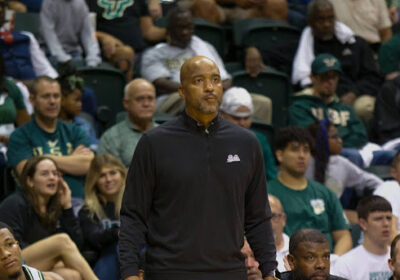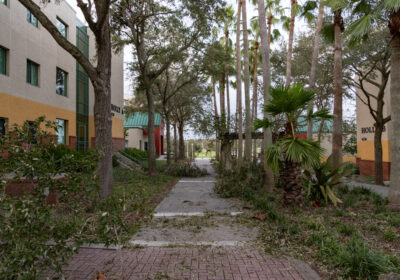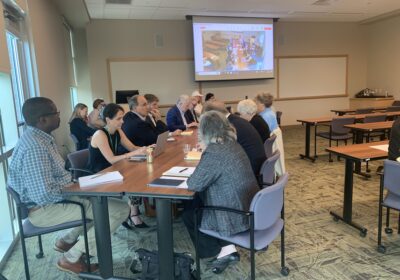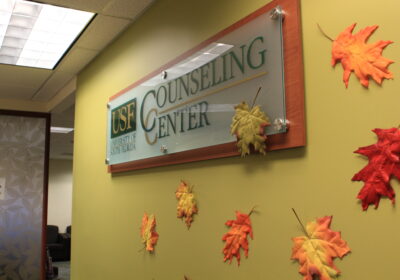Enlightenment Series panel interrogates truth of equality, how to effectively bring change

As part of the Office of Multicultural Affairs’ itinerary for Black Heritage Month, USF professors challenged systemic progress made since the Civil Rights Movement and discussed where society needs to change at the Enlightenment Series panel Tuesday.
Titled “From protest to progress, combating discrimination, bias and oppressive practices,” the discussion was hosted by the Institute on Black Life, Black Employee Steering Committee and Black Faculty and Staff Association (BFSA). The online workshop met on Microsoft Teams from noon to 1 p.m.
Over 100 students, faculty and staff attended the discussions led by Director of the David C. Anchin Center for the Advancement of Teaching Dana Thompson-Dorsey, Vice President-Faculty Liaison for the BFSA Geveryl Robinson and Interim Vice President for Institutional Equity Elizabeth Hordge-Freeman.
The hourlong seminar was proportionally divided into three sections — “is progress an illusion,” “polite protests prohibits progress” and “measures of progress and collective care” — each presented by a different speaker.
Thompson-Dorsey kicked the presentation off by introducing the question of whether or not the improvement that has been made by civil rights efforts is just an illusion. Utilizing her background in law, Thompson-Dorsey analyzed the uphill battle against racist legislation that prohibited Black citizens from expressing their Constitutional rights.
“[We needed the] Voting Rights Act of 1965,” she said. “Even though we had that 15th amendment right, we needed another piece of legislation to say we [the Black community] have the right [to vote].”
After historically dissecting past infringements on the Black community’s basic liberties, Thompson-Dorsey welcomed participation from the audience to identify prevailing flawed legislation.
This exchange between the panel and audience raised disapproval with the current stripping of voting rights for those currently and formerly incarcerated, especially since the Black population has the highest incarceration rate.
Robinson spearheaded the second section of the workshop with an introduction to the false promises of “polite protests” and the real definition of compromise from an advocacy perspective.
Using the alliteration “polite protests prohibit progress,” Robinson explained that movements desiring change don’t address their expectations in a productive manner to institutions that have the capability to deliver it.
She also said that polite protests result in compromise, and this outcome for movements yearning for equality leaves those impacted accepting lower than desirable results.
Robinson illustrated the dynamic as being similar to a child’s rocking horse. Although motion can be produced on the toy, there is no progress being made in terms of how far it can go.
Shifting focus to USF, Robinson identified the university as having all of the appropriate prerequisites to house an honest and inclusive culture, but lacks the action necessary to live up to its diversity and inclusion statement.
The change that is required to improve the university is halted by the institution’s power to reprimand individuals who expose its flaws, according to Robinson.
“If there’s more truth in the hallways than in meetings, you have a problem,” she said. “People who believe not all differences are respected, or that not everyone benefits equally, are too afraid to speak up in fear of getting fired or punished.”
Hordge-Freeman led the remaining time allotted for the panel by offering variations of protests that would yield more productive results.
“This might look like creating stricter work-life boundaries, creating an identity that is not so attached to the work that you do, confronting toxic colleagues and documenting your microaggression,” she said.
Productive change is adjustments made to policies and social infrastructure that catalyze a shift in culture, according to Hordge-Freeman. She told the audience this can be accomplished in their personal lives by networking with people who want real change.
Overall, Robinson was happy with how the event went. She said the turnout was a satisfactory number because it provided a comfortable environment for the audience to fearlessly share their thoughts.
“We like to have discussions and we want people to feel comfortable talking,” she said. “If your direct supervisor or people in the administration are there, some are afraid to speak up or they may hesitate.”
Robinson is optimistic about USF’s potential to become the environment its diversity statements characterize the university to be. She said she believes it is going to take time and a redirected focus on the community.
“I do believe that most people who work at USF really see great potential, but it’s like growing pains,” she said. “USF is young, and you go through pain when you’re having a baby. But when you’re having a child, something beautiful will emerge.”






